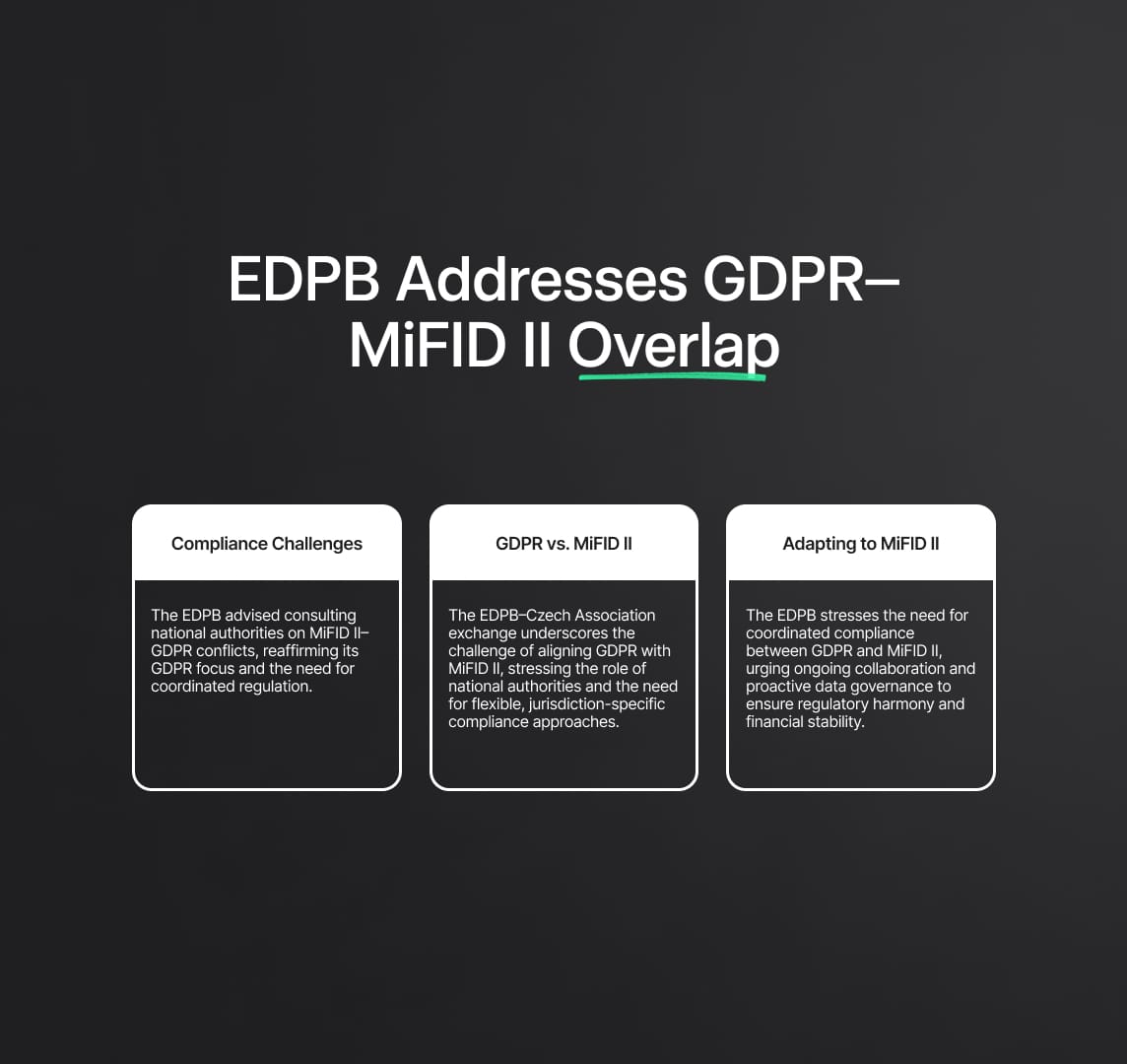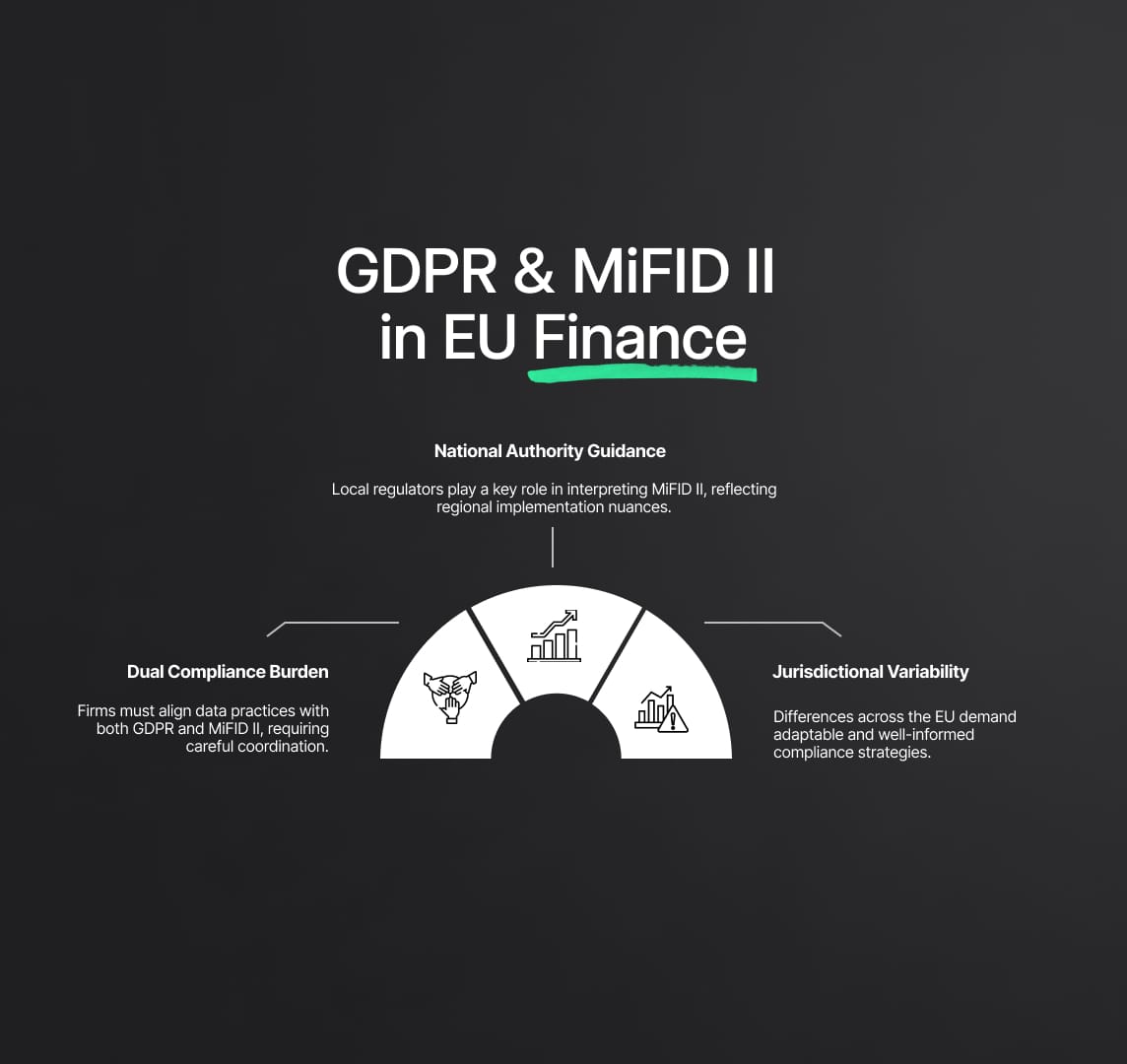MiFID II Regulation and GDPR
Highlighting the intricate balance between GDPR and MiFID II Directive, this text delves into the challenges faced by EU financial institutions. It underscores the pivotal role of national authorities and the necessity for adaptable data management strategies.


Interaction Between GDPR and MiFID II Addressed by EDPB
In a recent development, the Czech Association of Financial Advice and Intermediation Companies sent a substantial inquiry to the European Data Protection Board (EDPB). The question centered on the complex interrelationship and possible inconsistency between two important regulatory frameworks: the Directive 2014/65/EU, sometimes known as the MiFID II Regulation, and the General Data Protection Regulation (GDPR). The investigation was especially concerned with the practical implications of putting certain clauses into effect, including Articles 16(6) and (7) of the MiFID II Regulation, a law that is extremely important to the European financial services industry.
The instructions released by the Czech National Bank, which emphasized the difficulties and complications faced by financial institutions in aligning their operations with both GDPR and MiFID II standards, provided the background for this investigation. In its statement, the EDPB stressed the significance of comprehending the complex interactions between financial legislation and data protection, while also acknowledging the critical nature of the inquiry.
The EDPB did, however, clarify its stance by asserting that its jurisdiction and role are separate from those of national regulatory authorities. For organizations looking for clarification on regulatory compliance, this distinction is essential, particularly in situations where sector-specific directives like MiFID II and EU-wide rules like GDPR collide.
The EDPB suggested that the Czech Association hold direct consultations with the Czech Data Protection Supervisory Authority in order to offer more specialized support. This advise was predicated on the knowledge that different EU member states may have varied implementation and interpretations of MiFID II, which makes local supervisory bodies more qualified to provide particular assistance.
Additionally, the EDPB used this chance to restate its commitment to making sure that the GDPR is applied uniformly and amicably throughout the European Union. In an increasingly digitized and interconnected world economy, preserving a unified data protection landscape is critical. This commitment is necessary to make that happen.
This exchange serves as a reminder of the continuous efforts made to reconcile the MiFID II Regulation's data protection standards with the particular demands of the financial industry. In order to guarantee that laws like GDPR and MiFID II function in concert to safeguard consumers and maintain a stable financial market, it emphasizes the necessity of ongoing communication and collaboration between diverse regulatory organizations, both at the EU and national levels.

GDPR Meets MiFID II Directive
The European Data Protection Board (EDPB) and the Czech Association of Financial Advice and Intermediation Companies recently interacted, highlighting the complex world of financial regulations and the need for a careful balance between the General Data Protection Regulation (GDPR) and the MiFID II Directive. For financial institutions in the European Union governed by the MiFID II Directive, this development is especially important.
- Challenges with Compliance: Financial advisory and intermediation firms have a lot of work ahead of them to get their operations in line with the GDPR and the MiFID II Directive. Data processing and protection procedures need to be carefully balanced and understood in order to achieve this dual compliance.
- The Role of National Authorities: The significance of national supervisory authorities is emphasized in the EDPB's advice, particularly with regard to interpreting the MiFID II Directive. These authorities provide regional perspectives, which are essential considering the possible differences in implementation throughout EU members.
- Variability Across Jurisdictions: Businesses must remain knowledgeable and flexible due to variations in how the EU is interpreting the GDPR and the MiFID II Directive, which can result in a wide variety of compliance techniques.
Adapting to the MiFID II Directive’s Demands
A key component of the regulatory framework that ties in with the requirements of the MiFID II Directive is the EDPB's dedication to the uniform application of the GDPR. In a globally interconnected digital economy, their advice and assistance are essential to preserving a unified approach to financial regulation and data protection.
- Cooperation Is Essential: Securing a balance between the obligations of the GDPR and the MiFID II Directive requires continuous communication between national regulators, EU authorities, and financial institutions. This cooperative strategy is essential to guaranteeing that the two sets of regulations function as a unit.
- Proactive Measures for Compliance:
- Interact with regulatory organizations to comprehend changing needs.
- Update data governance frameworks often to comply with new laws.
- Update data processing plans to guarantee adherence to the GDPR and the Directive MiFID II.
- Preserving Financial Market Stability: Financial institutions are essential in safeguarding the interests of their customers and keeping the financial market stable by adhering to the criteria of the GDPR and the MiFID II Directive.
Reduce your
compliance risks

